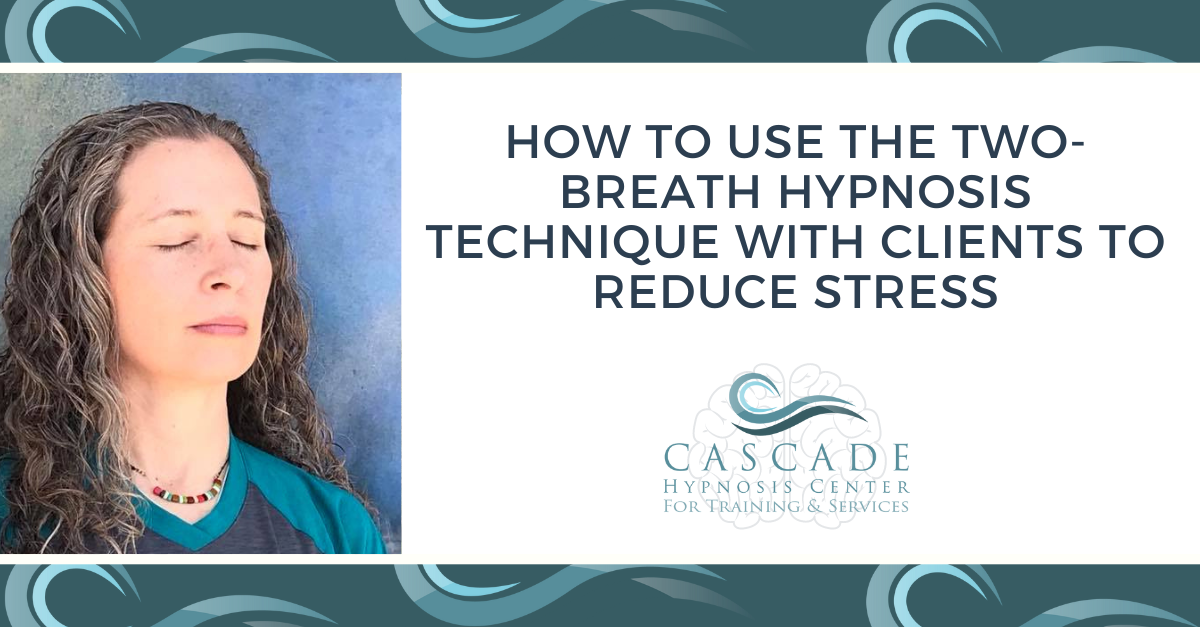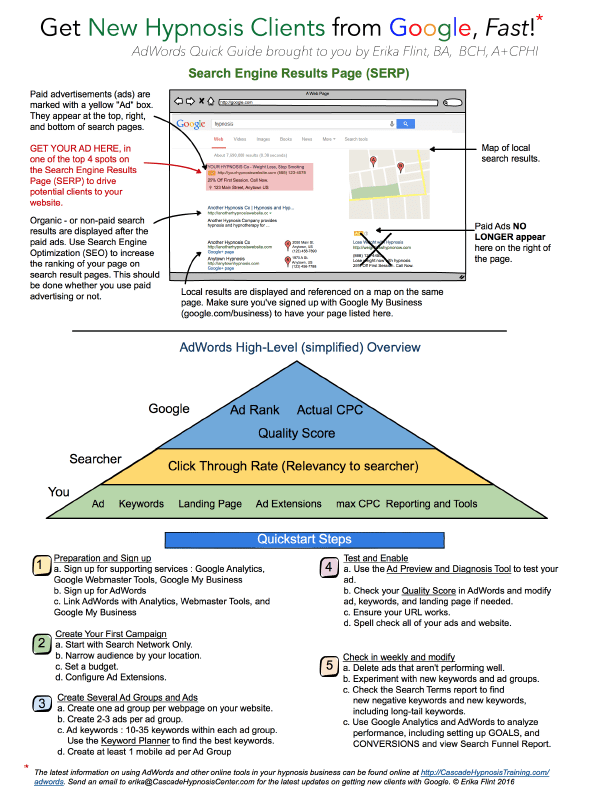From Two Pots to Two Cups a Day with Hypnosis and Heather Stewart
What first got you interested in hypnosis? What's your origin story?
I was 20 years old and went to a side-show. I thought it was the craziest thing how people would get on stage and see people, not controlled, but how they had their mind guided; and I thought that was phenomenal.
Then fast forward to 2017 and I started thinking, "What do I want to do when I grow up?" I have my own business, and it's good, and I do enjoy it, but there was still something missing.
So I did what was recommended: go back to what you love -- do what you love and you'll love what you do. I started looking into alternative practices like homeopathy, energy healing, and things of that nature. Within about four weeks I found Cascade Hypnosis Center in Bellingham and contact you (Erika).
So you trained at Cascade Hypnosis Center in September?
Yeah, I took the classes in September, graduated in October, and started practicing December 1st, 2017. It was seamless. Right out of the classroom I knew this was what I wanted to do.
Have you used hypnosis yourself?
I have for a number of things. The first was I saw a woman I knew in Canada who was a hypnotist, to stop spending money. I wasn't a big spender, I just didn't want to spend needless money. I wanted to save since there wasn't a lot coming in and my kids were little.
I saw her three times and all of a sudden I was saving money. I was being discerning about where my money went.
I didn't feel the difference until I had to renovate a house and had to spend money. I didn't want to spend money because of the hypnosis. I was really marveling at how, okay, you have to buy wire, you have to buy drywall, you have to do these things. What the heck, Heather? It was phenomenal how well the hypnosis had stuck.
Another time I used hypnosis was for coffee. That was a big one because I was drinking a pot or two a day, and I'm sorry, but that's not healthy. And that to this day has stuck and I only have two cups a day.
The biggest hypnosis success for me though was healing from my past. I had been in talk-therapy, which was great, but there were still triggers there. I could consciously understand what was happening to me, but there was still a visceral reaction happening. I was 46 years old and had been carrying around this stuff literally since I was a few days old.
With hypnosis, I was able to get rid of and unload it, which led to moments of huge release and lightness. Then when something happens the next time I felt, "A-ha!" I can honestly say I've dealt with this for the first time in my life.
Who are you helping now? What kind of issues are people coming to you for now?
I see clients for all of the things. But primarily my ideal clients are people with past stuff, that isn't necessarily giving them a bad life, but is causing bad reactions within their life. They don't like the path their life has taken. They don't like how they're reacting at work, with their spouse, dealing with anxiety, etc. Some may call that PTSD. Sometimes these emotions lead to coping strategies like eating or drinking too much. But the overall problem is too much emotion in a sense.
What happens with a lot of these clients? What are you finding?
A lot of these clients have tried all sorts of other therapies, they've felt some form of resolution, but then stuff is still happening. They don't want to have to talk about it all again.
My response to them is we're gonna be done though. This will be the last time, and we're gonna actually be done.
-Heather Stewart
We get to the root cause of what's driving their unwanted behavior. They feel more peaceful.
Can you tell us a client win or inspirational story?
I had a client with a phobia of swimming that was built from a stressful situation. She had literally drowned when she was four years old. It's a logical fear that had compounded over time because her parents became overprotective (understandably). The feelings of fear were attached to the thought of what could have happened. The worst didn't happen thankfully, but they were still reacting almost as if it had happened.
Fast forward and she's 46 years old, her children are in their late teens, and her husband has bought a boat. They're also going to Hawaii and the family wants to go deep sea diving. And she can't go in the water, get on a boat, or even put on a life jacket without panicking.
We were able to do hypnosis to get those deep seeded fears unstuck, and by the end of it she was going out on the family boat; and she was able to go swimming in the ocean with her girls without a life vest in Hawaii.
As a professional hypnotist, there are things that we notice and help guide our clients through, but ultimately they are doing the work. That's why hypnosis works so well with a professional compared to YouTube videos -- because you have personal response and personal suggestions that are tailored exactly towards your client. We notice their responses and emotional states to ensure they're working through everything. That's always why hypnosis is usually faster than most other things they've tried. It also helps to know that someone is on your side and isn't leaving, no matter how hard the healing gets.
And I just feel compelled to mention one of the things that really surprised me in my practice, and I've been doing it for almost 10 years now. I'm a very logical person, and I always want there to be an answer, something that kind of makes sense. But throughout the years, what I noticed is that in some situations clients, and I would say humans and the human heart and the human mind, just want somebody there with them.
Meaning we might have a client who's going through a really low point in age regression or something like that. Like it's a horrific experience, let's just say. But just sitting with my client, with that experience, they feel seen, heard, loved; there's nothing wrong with them. I'm not running away.
-Heather Stewart
I just love that with hypnosis we can get to that root cause, and really help them remove unwanted feelings. During hypnosis we really get into that feeling space.
Do you live hypnotically and incorporate hypnosis into your daily life?
I am a practitioner and teacher of 7th Path Self-Hypnosis®. It takes some time, but does an automatic zen on my brain. It's anchored some positive hypnotic anchors, which can also be called classical conditioning.
The second is a form of bilateral stimulation, where if I'm feeling anxious I start crossing my arms back and forth in front of me to try and redirect the anxiety. I use this one all the time. It can combat the fight mode when fight-or-flight happens.
I teach these to my clients too because anti-anxiety techniques is a big part of our job. Sometimes it takes a minute to remember in the moment, but we can remember "I don't like feeling this way. I don't have to feel this way." And like any habit, the more you do it the easier it becomes until it's almost automatic.
It's also important to remind clients to not feel bad when they notice they're having those hard feelings again. It's counter productive to shame yourself about not acting fast enough, or forgetting entirely to do one of the anti-anxiety techniques. I even tell them that there is no wrong way to do the techniques.
If you could give your potential clients a message of hope, or a message about hypnosis, what would you say?
You don't know what you don't know. Most of our clients know what hasn't worked for them, hence why they start to look in another direction. Sometimes finding the right person is important -- to find a therapist or hypnotherapist that you really groove with.
With hypnosis you'll achieve more in five sessions than 12 months of other types of therapy. You will not be the same even after the first session. They can be exactly where they want to be.
I love what I do and it makes me really happy to help people.
What surprised you about being a hypnotist?
Lots of surprises. First, I'm surprised at how often people surprise me. I see a lot of clients with emotional trauma, and it surprises me how much people have gone through.
It also surprises me that I put myself into a state of hypnosis to walk with them through it. I'm able to put real, deep empathy into working with them. I really feel where they're at, and can still guide them through healing and come back feeling good after the session. I know they're going to get results, and that makes all the hard work so rewarding.
Anything else you'd like to share about hypnosis or being a professional hypnotist?
It's super rewarding and you get to meet all kinds of people. If you're interested in becoming a hypnotist, go to school, become a hypnotist, and just start doing it. You don't get experience unless you put yourself out there and try.
You can contact Heather by visiting https://cascadehypnosiscenter.com/heather-stewart
I'm Erika Flint and you can find me at CascadeHypnosisTraining.com where we train compassionate humans to become professional hypnotherapist with thriving practices.
Thanks for joining us and we look forward to seeing you for the next episode of Living Hypnotically.



